Mysuru-born Harvard Professor Gita Gopinath, popularly called as GG, has been appointed as the Chief Economist at International Monetary Fund (IMF). She is the first Indian woman to occupy the coveted post and the second Indian after former RBI Governor Raghuram Rajan. Star of Mysore had featured Gita Gopinath under its column ‘Mysoreans Making Us Proud…’ in its issue dated Dec. 28, 2013. The same is reproduced here. – Ed
To be listed as one of the ‘25 Smartest Indians to look out for’ is no mean achievement for a 41-year-old! The very mention of it makes this intellectual powerhouse blush, as she brushes it aside, wondering how these lists are made! But those who added her, know for sure why Gita Gopinath, deserves to be there.
A Mysorean and a Professor at the renowned Economics Department of Harvard University, she is the first Indian woman after Nobel Laureate Dr. Amartya Sen and the fourth woman in the Department’s history to be granted tenure. Sharing office space with Dr. Sen, Prof. Gita works in the area of international macroeconomics and finance and her field of expertise is regularly showcased on the global scene.
A mother of a 10-year-old, she strongly believes that a woman can successfully juggle home and work with the right kind of family support. A BA in Economics from Delhi University (Lady Shriram College), MA from the Delhi School of Economics and University of Washington and a Ph.D from Princeton University, Prof. Gita was also chosen as one of the Young Global Leaders in 2011. But it all began in Mysore.
An economist who enjoys Bollywood films and gossip as much as she delves into the financial crisis in the world, Gita is married to former classmate Iqbal Dhaliwal, a Director of Policy at Abdul Latif Jameel Poverty Action Lab at Department of Economics, Massachusetts Institute of Technology. She is the daughter of T.V. Gopinath an Industrialist in city and Viji Gopinath who runs a play home in Kuvempunagar. Here, in the first in our series ‘Mysoreans making us Proud’ we feature this remarkable achiever, as she traces her journey from Mysore to Harvard. Excerpts…
Star of Mysore (SOM): You have so many firsts and prestigious assignments to your credits. How best do we introduce you?
Gita Gopinath (GG): A Professor at Harvard…That’s how I introduce myself!
SOM: You spent your formative years in Mysore, which is still considered as the ‘country cousin’ of the big metros. Did you also have the ‘small-town’ girl feeling when you moved to Delhi?
GG: Yes…. I did my Bachelors in Delhi University and when I went from Mysore to Delhi I certainly felt that way. Most of my classmates were from main brand schools in Delhi. They seem to have a lot more global exposure. They were very good at debating and other kinds of things…They seemed to have a lot of confidence. Coming from Mysore I did feel like I was a small fish in a big pond.
However, one thing I was always good at is, I was never apologetic about my background and I didn’t get intimidated by people coming from so-called better background.
For all the ‘small town’ folks out there, to succeed, I think it’s a combination of not being apologetic about your background and also learning from your environment. At no point should you be intimidated, always believe you are your own person and you have a lot to contribute. At the same time pick up all the good things that are available. If you engage in self-doubt, then you’ll never have the confidence to grow.
SOM: Economics has always been called a ‘dismal science?’
GG: Oh! That goes back a long way. The original kind of Adam Smith’s idea of Economics was that there was no real role for policy in initiating an economic outcome. In that sense it was called a ‘dismal science’…where you would have bad times and you would just have to live with it. But that changed a lot over Kaynes’ revolution and now we don’t think that way. We think there are ways of fixing problems with policy interventions.
SOM: In India, pursuing Economics as a career-building course is not considered a viable option?
GG: Yes and No actually…If you think of Delhi University, its one of the most sought after subjects. This notion that it is not an attractive option for a career is more true outside Delhi and Calcutta Universities. In terms of future careers, Economics is still very strong in places like Delhi.
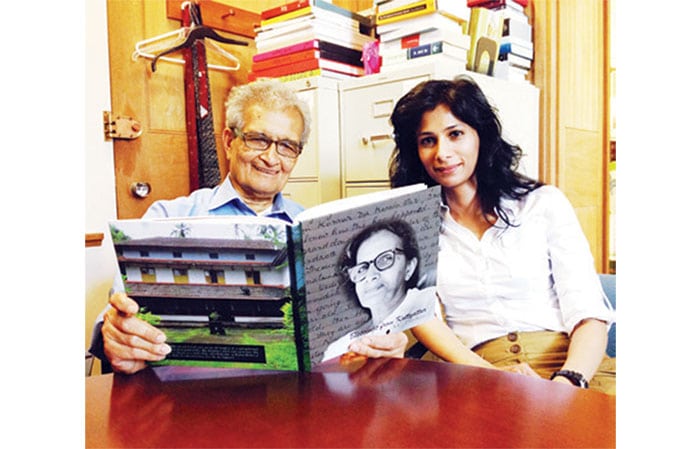
Gita Gopinath is seen with first Indian Nobel Laureate Dr. Amartya Sen. Dr. Sen is seen reading a book written by Gita’s grandmother about their family.
SOM: You mean there’s a lot lacking in the colleges outside these cities?
GG: I just think that there is not enough depth in the Universities that teach Economics. Except for about 3-4 schools in India, Economics is not taught the way it should be. Say for instance, in the US, even if you studied in the 50th ranked US University, you would still get very good education in Economics.
Economics has changed a lot over time; we have had a lot of mini revolutions in Economics. If those tools are not being taught, then it’s not quite useful.
SOM: There is a lot of parental pressure not to pursue Arts…
GG: What people observe is, if you do Economics from one of the smaller Universities, you don’t really end up getting good jobs.
Also here students enroll in Economics as a last resort and so it’s not surprising that they don’t end up doing very well. It’s true that people should be less obsessed with professional courses but it’s also true that to make it more attractive, there should be good quality education in Economics.
SOM: You are the first Indian woman to be tenured at the Economics Department of Harvard University
GG: If you consider the history of the Harvard Economics Department ever, I would be the fourth woman and the first Indian woman.
Right now, we have 40 tenured faculty of which two are women. Circumstances have changed from when it used to be harder for women. What we have there is what we call a tenure clock. After your Ph.D, you start off as a Asst. Professor and you have about 7 years to prove yourself in terms of publications and your impact in the research field. After 7-8 years, you either get your tenure, which is permanent or you leave. It’s either up or out.
Most of us by the time we finish our Ph.Ds, we are 27-28 and for the next 7-8 years, till we are 36 or so, we can’t do anything but focus on writing papers and for women these are the child bearing ages. That becomes very difficult for women, as they have to make a very hard choice. But now what Universities do is, if you have a child, they stop your clock, that means if the typical clock is 7 years, if you have a child you get 8 years.
Universities these days are trying very hard to find good women candidates.
SOM: Clichéd but still… Does being one among the just the two women in a faculty of 40 men bother you?
GG: I don’t think at any point of time I felt any kind of conscious discrimination or any such thing. What’s true is that you go to take classes and you notice that 90% of your professors are men. You go to a conference and 90% of the people in the room are men. And you always wonder what’s this about!
SOM: Would you have preferred more women though?
GG: Oh! Yes. From my experience I do find that women students in Harvard in the Economics Dept. talk a lot more to me, because there is more affinity and they talk about how it is like to have a career, family, a child etc.
SOM: You have been listed among the 25 Smartest Indians to look out for.
GG: (blushes) I have no idea. I am very honoured to be on that list but honestly I have no idea how they come up with that. But nevertheless I was disappointed that there were only 3 women in that list. If I was to come up with 25 bright Indians, I would come up with 50-50. I guess they are trying to reflect the overall sample and probably there were more men who were successful. I don’t really know what it means to be there.
SOM: Okay, what do you think then that makes a woman smart?
GG: Someone who has found an area that they want to be in, work extremely hard to develop an expertise that sets you apart from others. The only reason why I know my Economics well is I spend 15 hours a day studying.
What distinguishes you is hard work and then you become a person who is less indispensable, because you have created this niche for yourself.
SOM: It’s said, a woman has to work twice as hard as a man to be considered at the same level?
GG: That depends on your family situation. If you are married to a person who expects you to work hard in the house and outside of it, it can be very difficult and almost impossible. In my case I have been very fortunate that I have been married to a person who is very supportive.
What’s true though is in professions where there are fewer women than men, you have to work harder in terms of collaboration and network. May be I feel this way because of the country in which I am working. I have not had any experience of working in India in a field dominated by men.
That said, in some ways India does better. Most of the Banking Heads are women, which is not true in the US.
SOM: You had a slightly different view from C. Rangarajan on Higher tax for the super rich?
GG: What I just said was that, in general raising tax creates distortion, in the sense it affects incentives. Most of the evidences, lots of evidences in fact, we see, suggests that it’s better to make tax system more effective, reduce wastage of government expenditure by improving the quality of deliverance of government schemes. You might be better off reducing on wastages in government expenditure rather than going about introducing new taxes. And in India, the tax base in terms of leakages in the tax system is still quite high. To make it more effective is better than introducing unnecessary tax.
SOM: Did you know that BJP plans to get rid of all taxes? It’s just going to tax on bank transactions?
GG: I haven’t heard of that! This is generally called financial tax but it’s not implemented in any country so far.
SOM: You have said that a State can be a welfare State and also business friendly. How do you rate Karnataka in this context?
GG: I must confess that I haven’t gone deeply into Karnataka’s state. In Karnataka, people recognise Bangalore as an outsourcing major. It’s done well on some business indicators. But what I know is that the political situation is quite messy and that’s problematic. In fact I have some figures for you. In a publication by the World Bank and the International Finance Corporation titled ‘Doing Business in India,’ that measures business regulations and their enforcements in India (the study involved 17 cities), Karnataka stands 13th among the 17 cities which come under cities easiest to do business in India. That’s not very encouraging! Ludhiana, Hyderabad and Bhubaneshwar take the 1st, 2nd and 3rd place respectively, while Chennai, Kochi, and Kolkata take the 15th, 16th and 17th places respectively.
SOM: The fall of the Indian Rupee has come in for a lot of flak?
GG: Among the many variables that affect the value of a rupee is inflation. If you look at the rupee with reference to the dollar and compare India and the US, look at in the last 7-8 years, then inflation in India has been higher.
The other variable is growth and in that dimension India’s growth rate is much higher than the US. It’s come down now, but it’s higher than the US. And by that matrix, India’s rupee should have strengthened. But the question is, which of these two forces were stronger in terms of affecting the value of the rupee.
And when the rupee fell specifically, at that time there was reason to think that the rupee needed to lose some value given the inflation channel was very strong.
But eventually there will be a correction in the rupee. Now that combined with what’s happening externally, besides inflation and besides growth, it matters what’s happening to the interest rate in the rest of the world. When in summer the US said that they would start tapering and the interest rate will go up in the year, for an investor the US becomes more attractive to bring money back in. And we saw withdrawal of money from India going to the US. A combination of all these factors led to the weakening of the rupee. It’s very very hard to predict what will happen to the rupee over a short period of time, better predicted over a longer period of time.
SOM: But the blame was squarely on the ruling government. How fair was that?
GG: I think in this case, the last 3 years there has been a problem with governance in India. There has been a problem with governance in general always. Look at the number of government projects that have been stalled, scams have gone up, bureaucracy has come to a standstill, nobody wants to move anything using scam as excuse. It’s not unfair to blame the ruling government!
SOM: For a layman, how does the future of India seem in terms of the economics?
GG: The layman needs to realise that India’s potential is high. To get the growth to go back up from the low level right now at 4.8% to 6.6 or 7% you don’t have to do very dramatic things say like reforms, get fantastic education for all, change labour laws et al. right away. You need to do all that in the long run.
Right now simpler things like making sure that the projects get going, the ones that have been stalled, put the infrastructure in place, put the investments in place. In that sense it is simpler to engineer growth in India than let’s say in China where it is a bit over invested in infrastructure.
Today’s stand is that if there is a more decisive government in power next year, that should be sufficient to get a lot of people interested in India again. So these kind of small things are enough to instil growth again in the country.
SOM: So there’s no big reason for us to feel down and out?
GG: No, the main big uncertainty is what happens next year with the elections. My hope is that even if there’s a bigger coalition but still they will be able to function and be more accepted. My only concern is, if something really messy happens with the Centre and you are going to have another election.
SOM: A photo of your parents also finds a pride of place on your desk? (Industrialist T.V. Gopinath and Viji Gopinath, who runs a Play Home in Kuvempunagar, are her parents)
GG: They are in my heart! They believed I can accomplish much more than what I thought I could. In fact I was in Science stream in PU (Mahajana’s College) and I went to study in Delhi because I wanted to do my IAS. My father called me and told me that there’s something called a President’s Gold medal if you stand first in the Delhi University, after 3 years if you scored the highest, cumulatively … I did win that…He said it as if it was so easy and I never felt it was unattainable. Then he said you should study in Harvard. They kept raising the bar every time and it also helped that my personality is such that I like challenges.
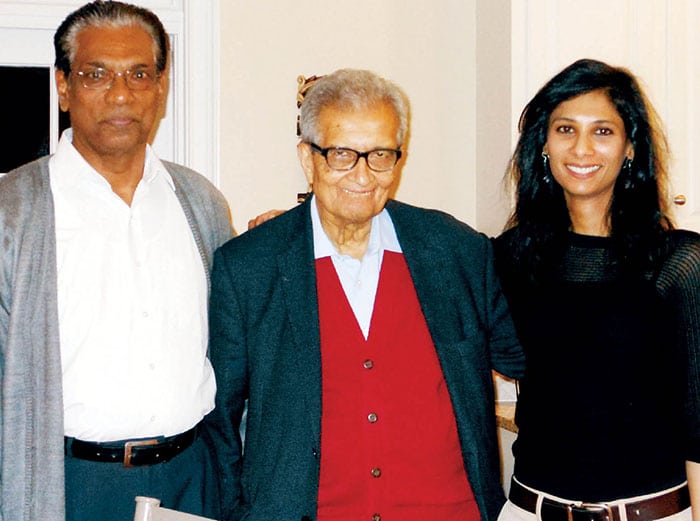
Gita Gopinath with her father T.V. Gopinath and her mentor Dr. Amartya Sen at Gita’s home in Boston, USA.
SOM: Do you like to be a role model?
GG: Yes and No. I want people to kind of look at me and see that they too can do it. I want them to see that in international matters they can look like me, an Indian woman, in the sense that I want them to get a lot of confidence.
On the other hand I don’t want them to put me up there. I never did that. I never put anyone on a pedestal.
A lot of what you want to become should come internally. It’s what drives you. One can get inspired, but there shouldn’t be a fan following! Your strength should come from within and not from anything outside you.
SOM: It’s said Mathematicians, Economists lead a boring life?
GG: I disagree! Of course I enjoy life! Someone who looks at me from outside may find that I’m leading a boring life. I enjoy my life to the hilt. In fact the mathematicians or physicists whom I meet in Harvard lead incredibly enjoyable lives ! It’s just about the definition of enjoyment! I get time to enjoy the smaller nuances of life. Yes I’m a workaholic and I get pleasure from working, but I have time for things I like. I know as much about Bollywood as I know about Economics! Pretty amazing actually and my friends always make fun of me about that.
SOM: Mysoreans are proud of you… How proud are you as a Mysorean?
GG: I spent most of my early years here. Some of my best friends are from Nirmala Convent and they are still my best friends. I liked that I grew up in a small town. You are more empathetic, there’s a little bit more innocence in you which is good and you grow up with some basic principles…like to achieve something you have to work hard for it. I tend to derive pleasure from doing simple things and keeping it simple. So, yes, I am happy I’m from Mysore .



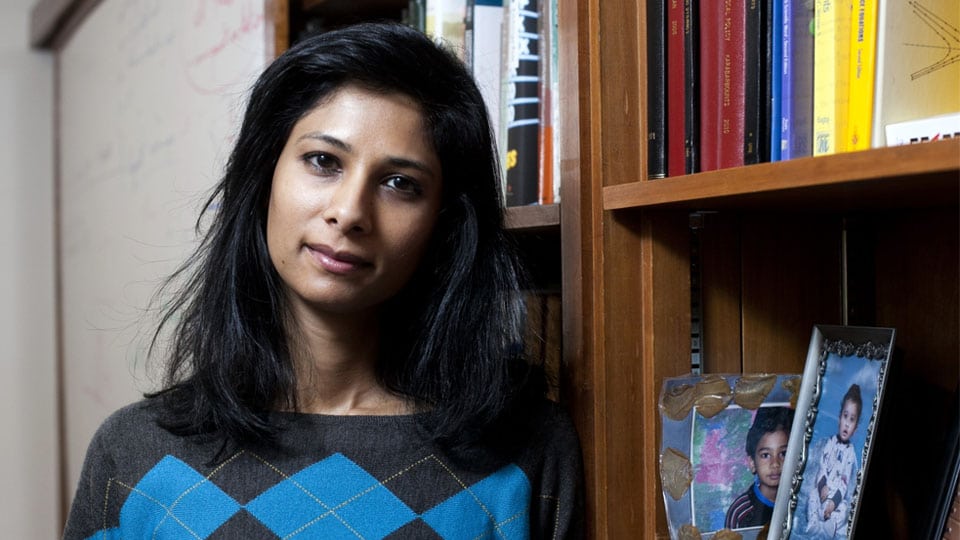
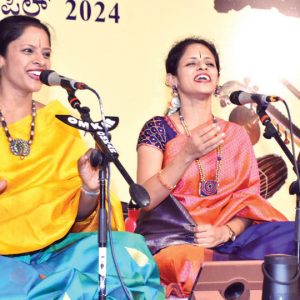
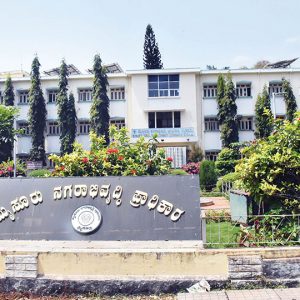
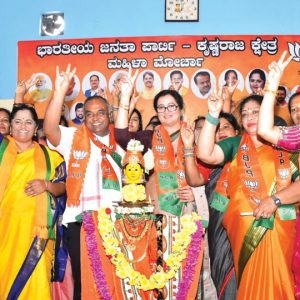

Good that a Mysurean has made it this high! I wish SOM had posed questions related to Kannada culture and background, how she scored in school subjects etc. When I read national newspapers, they only talk about her doing her master in DU. Nothing about her roots in Karnataka.
Neither does GG shown her Kannadiga identity. This is very important for successful folks to do so because that encourages other budding talents to bloom under Karnataka aegis. Readers would know that a successful Bengali or Tamilian would brandish their state identity as much as their national identity. I am happy for them because that is how it should be.
I wish a million times successful Kannadigas also do the same when the spot light is on them. This is called Network Feedback Effect where more people willingly sport their identities instead of hiding behind some other kind. Indeed it makes citizens of a state to come together, place common state interests above partisnal issues, vote accordingly and defend our natural resources.
Think about it. Thanks for reading .
A long time ago three stalwarts of old Mysore were seated on a Dias. They were the venerable Messrs Masthi Venkatesha Iyengar, Mirza Ismail and A. N. Krishna Rao(anakru). Masthi, a keen observer that he was, remarked that he was a Tamil Kannadiga, Mirza Ismail a Persian Kannadiga, but Anakru an accha Kannadiga ! Now coming to the issue raised by Mr Anup, I would draw his attention to the fact that The Gopinath family originally from Kerala, were in Kolkata when Ms. GG was born there, they lived in Delhi, Hyderabad, and moved to Mysore. Ms.GG, is therefore a true Indian having assimilated the intrinsic, composite identities imbibed and imbued from all the places her parents took her and her sister along as they grew up moving from one great city to another. Now, having reached the pinnacle of her chosen profession, she would be the darling daughter the whole world would adore. A true “Vishwa Manavi”, as defined by the great accha Kannadiga Rastrakavi Kuvempu.